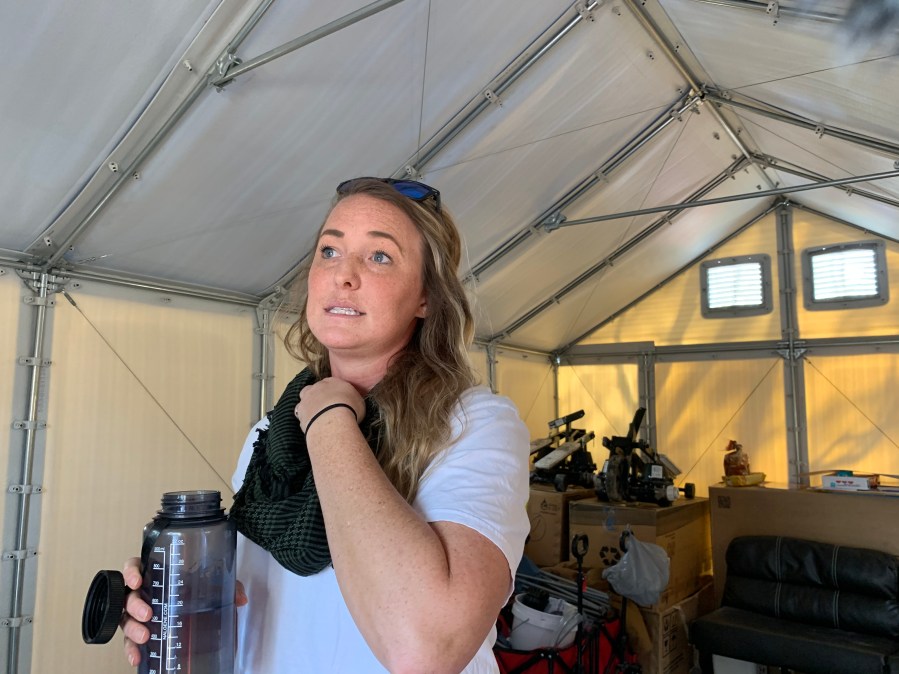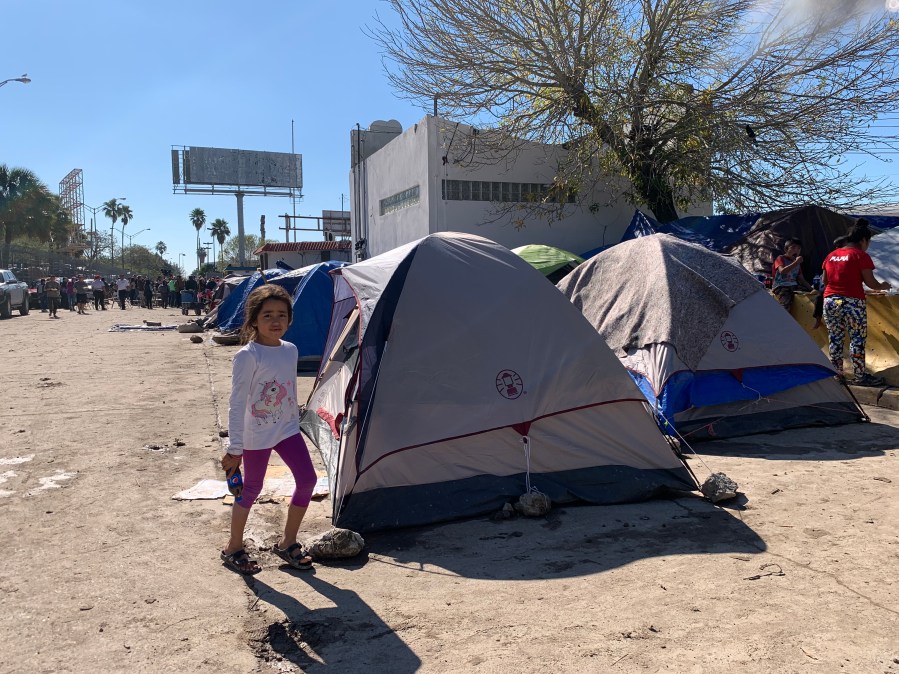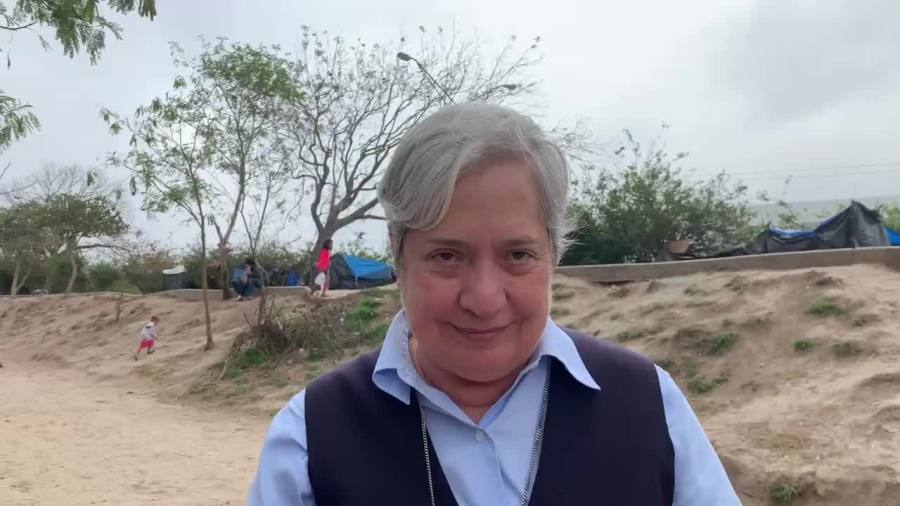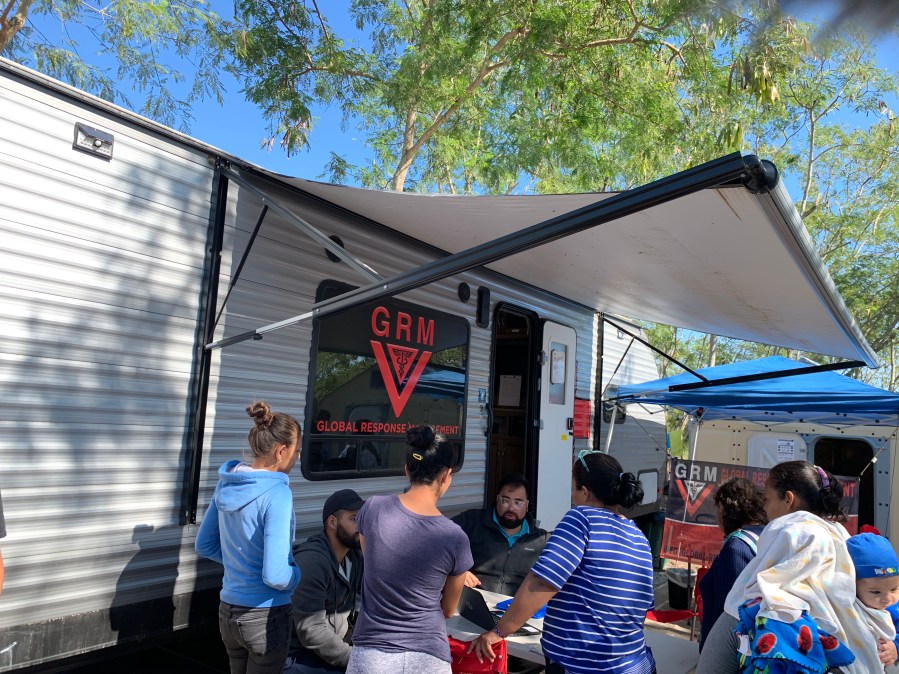Global Response Management, led by Helen Perry in Matamoros, operates a medical trailer and a few medical tents that provide health care to over 3,000 refugees at the camp in the northern Mexico border town. Perry told Border Report she has raised $500,000, enough to begin erecting a 20-bed tent hospital complete with diagnosis machines and emergency supplies.

All that she is waiting for is approval from Mexican authorities to allow her to bring in rapid COVID-19 tests, which she says are essential to learning who has the virus and who needs to be immediately isolated to prevent
The camp is located on the banks of the Rio Grande, at the base of the Gateway International Bridge, a stone’s throw from the shores of Brownsville, Texas.
“It’s really, really concerning. Self-quarantining in these conditions is not possible without a separate structure,” Perry said on Wednesday evening from the camp via cellphone. “We need to be rapidly testing and aggressively addressing this health situation.”

About 3,000 asylum-seekers live in the tent, but Perry said her organization treats for free an additional 2,000 asylum-seekers who also live in Matamoros and who come to her with health concerns, all desperate for medical care.
Furthermore, she said that the hospitals in Matamoros only have a total of 40 intensive care unit beds and 10 ventilators for the city of over 500,000 residents. During a recent meeting, Perry said Mexican authorities told her that it is basically up to her organization to provide all emergency care if a coronavirus case is detected
“I’m not going to lie to you. The information that we got today is not great,” Perry said in a somber Facebook post to supporters, many of whom her organization relies on for donations. “Unfortunately the situation that we find ourselves in is that the area where we are working is also limited in their ability to provide care. And so now … we need to rise to the occasion. We need to be ready to provide life-saving medical care to potentially hundreds of critically ill patients at the drop of a hat.”
Catholic Charities of the Rio Grande Valley Executive Norma Pimentel, a nun from South Texas who heads volunteer operations at the refugee camp, told Border Report on Thursday that Mexican immigration officials with the Instituto Nacional de Mexico “have approved setting up of the contained space for the hospital.”
Pimentel said the head of the doctors in Matamoros is supportive of the idea. The hold-up is getting approval for the rapid coronavirus tests, which local Mexican authorities do not believe is warranted, and which would require federal approval to cross from the United States.

“They don’t necessarily think that’s a good test or necessary at this time,” she said.
Pimentel said Mexican officials, as well as Matamoros residents, especially asylum-seekers, are fearful of what could happen to the city if COVID-19 hits.
“Everybody is very scared,” she said, adding that they are complying with recent INM requests that only local volunteers tend to the camp and nobody who has flown on an airplane recently or comes from another area so as to not bring the virus. “We have taken measures not to continue operating as we had for the safety of the camp.”
Read a Border Report story on Team Brownsville limiting volunteers to camp.
Further adding to fears are current health conditions in which a majority of the migrants already exhibit coughs, respiratory ailments, as well as other conditions such as lice, pink eye, and skin rashes from living outdoors for months without proper bathing facilities.
The majority of the migrants living at the tent encampment forced to remain in Mexico under the Trump administration’s Migrant Protection Protocols (MPP) program. In addition, there are also many Mexican nationals living in the refugee camp who are part of the metering program, which only allows so many people to cross a U.S. port of entry on any given day.
Read a Border Report story of Sister Norma giving U.S. lawmakers a camp tour.
“It’s very hard. Once it starts it’s going to be difficult to stop,” Pimentel said.

Perry, a nurse practitioner, said they practice what is called “humanitarian medicine,” which is based on future guesstimates of what could be needed in an emergency situation. In preparing for a coronavirus outbreak, staff looked to a report on how swine flu spread through a refugee camp a few years ago. Based on those transmission rates, Perry expects that over half — 1,750 people — could get sick in the camp if it becomes infected. Of those, they estimate that 10%, or 170, could need hospitalization, “and of those 8 or 9 could die,” she said.
The United States has a COVID-19 mortality rate of about 2.8%, while Italy’s death rate from the virus is 15%, Perry said. She expects that the close confines of the camp — if it were to become infected — would cause mortality rates to be higher than in the United States.
The tent hospital Perry is planning to erect would have the ability to provide IV medicines, oxygen, pediatric care and X-ray machines. “We could provide care right up to the point of intubation,” which requires a ventilator, she said.
She said in order for her facility to better help patients she still will need to raise $250,000.
“In humanitarian medicine, you pay in time or you pay in money. In this case, we don’t have time, so we need to raise money,” she said.
Visit BorderReport.com for the latest exclusive stories and breaking news about issues along the United States-Mexico border.
















